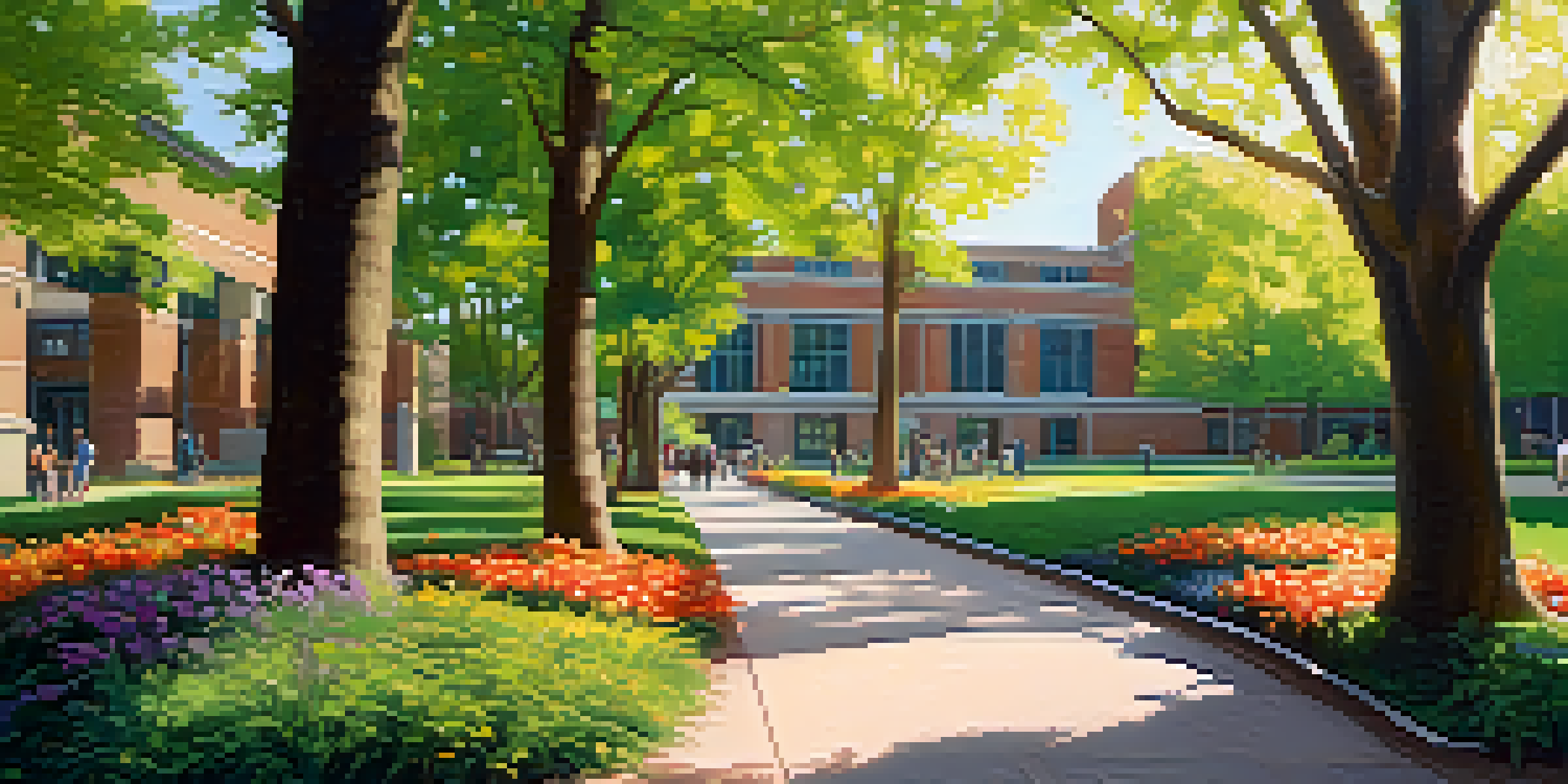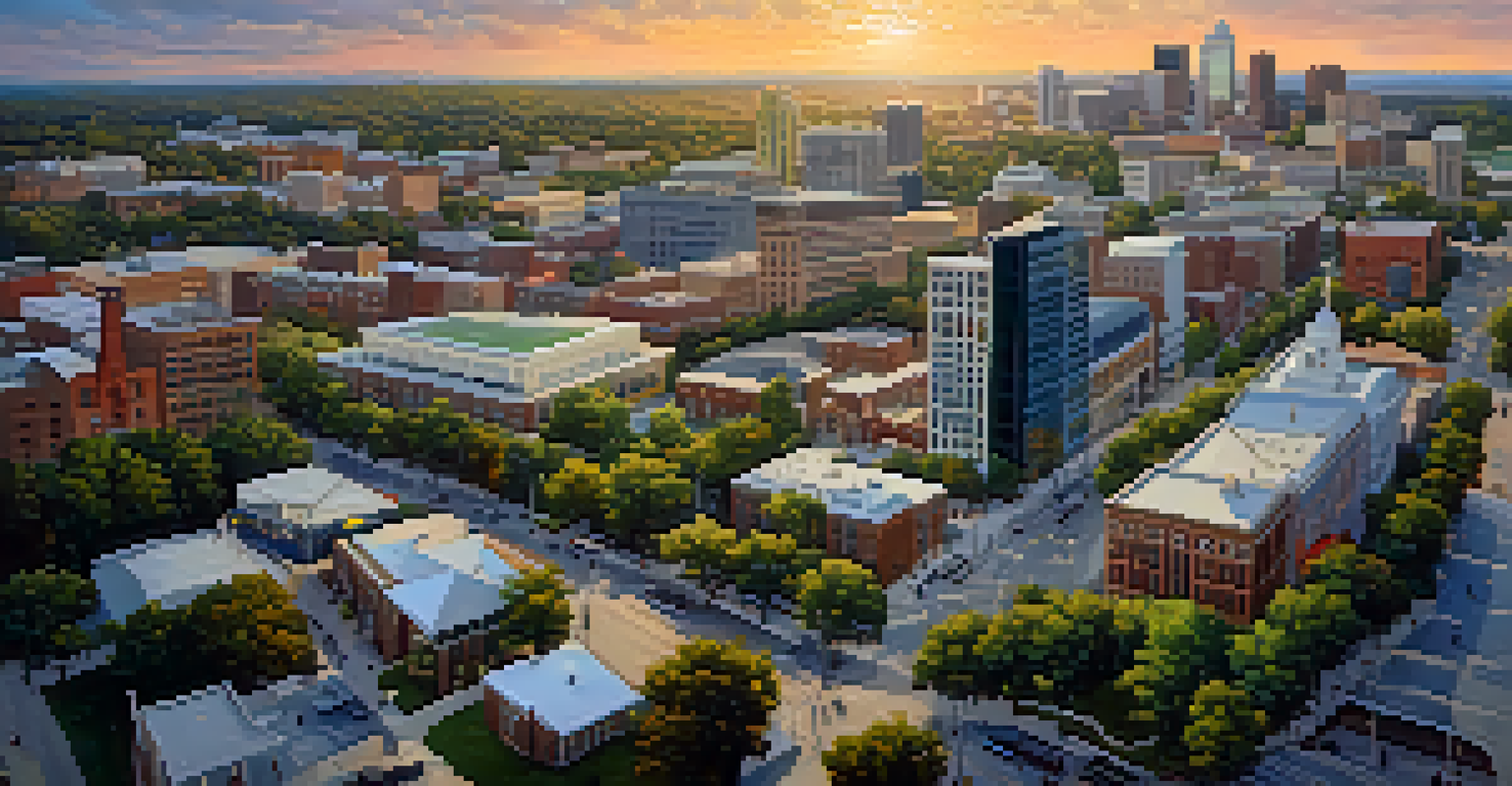The Role of Higher Education in Raleigh's Economic Growth

Raleigh's Educational Institutions Driving Economic Growth
Raleigh is home to several prestigious universities, including North Carolina State University. These institutions not only educate thousands of students but also serve as catalysts for innovation and entrepreneurship in the region. By promoting research and development, they create a skilled workforce ready to meet local industry demands.
Education is the most powerful weapon which you can use to change the world.
The presence of these universities attracts businesses looking for well-trained employees, which in turn boosts the local economy. For instance, tech firms often partner with universities to tap into research initiatives and recruit graduates. This synergy fosters a dynamic environment where education and industry continually support one another.
Additionally, the growth of educational institutions has led to a thriving ecosystem of startups, particularly in technology and biotechnology sectors. This creates job opportunities and encourages graduates to stay in the area, further contributing to Raleigh's economic vitality.
Research and Innovation: Fueling Local Industries
Higher education institutions in Raleigh are at the forefront of research and innovation. They conduct groundbreaking studies that lead to new technologies and processes, benefiting local industries. For example, the research initiatives at NC State in areas like agriculture and engineering have had significant impacts on North Carolina's agricultural sector.

Moreover, these institutions often collaborate with industry players, leading to the commercialization of research findings. This partnership not only enhances the competitiveness of local businesses but also spurs job creation. As companies leverage new innovations, they can expand their operations and hire more employees.
Education Drives Economic Growth
Raleigh's universities attract businesses and foster innovation, contributing significantly to the local economy.
The innovation ecosystem nurtured by Raleigh's universities also attracts investment from venture capitalists. Investors are drawn to the promising startups and research projects emerging from these institutions, creating a cycle of growth and opportunity for the local economy.
Workforce Development: Bridging Skills Gaps
A key role of higher education in Raleigh is addressing the skills gap in the workforce. With rapid technological advancements, employers often struggle to find candidates with the necessary skills. Universities respond by tailoring their programs to meet the evolving needs of industries, ensuring graduates are job-ready.
An investment in knowledge pays the best interest.
For instance, many institutions offer specialized training programs and internships, providing students with hands-on experience. This practical exposure is invaluable, as it equips them with the skills that employers demand. As a result, the local workforce becomes more adaptable and competitive.
Additionally, partnerships between educational institutions and local businesses help create customized training programs. This collaboration ensures that both students and employers benefit, leading to a more robust economy that can thrive in a competitive landscape.
Attracting Talent: Raleigh as an Educational Hub
Raleigh's reputation as an educational hub attracts students from across the nation and around the globe. The city offers a vibrant community combined with high-quality educational programs, making it an appealing destination for prospective students. This influx of talent not only enriches the academic environment but also contributes to the local economy.
As students settle in Raleigh, they contribute to various sectors, including housing, retail, and entertainment. Their spending supports local businesses and helps create a lively community atmosphere. Moreover, many students choose to stay in the area after graduation, providing a steady stream of skilled workers.
Workforce Skills Alignment
Higher education institutions tailor programs to bridge the skills gap, ensuring graduates meet industry demands.
The continuous influx of diverse talent fosters creativity and innovation, essential elements for economic growth. As these graduates enter the workforce, they bring fresh ideas and perspectives that help local businesses adapt and thrive in an ever-changing market.
Community Engagement: Strengthening Local Ties
Higher education institutions in Raleigh play a vital role in community engagement. They often host events, workshops, and programs that benefit local residents, fostering a sense of belonging and collaboration. This active participation helps bridge the gap between students and the community, creating a more cohesive environment.
For example, universities may offer free seminars or public lectures that educate and inform the community on various topics. These initiatives not only enrich the lives of residents but also promote a culture of lifelong learning. By engaging with the community, universities contribute to a more informed and connected populace.
Furthermore, students often volunteer in local organizations, bringing energy and fresh perspectives to community projects. This engagement strengthens the social fabric of Raleigh, making it a more attractive place for both potential residents and businesses.
Economic Diversification: A Resilient Future
Higher education contributes to the economic diversification of Raleigh, making the local economy more resilient against downturns. By fostering various industries, including technology, healthcare, and the arts, universities help create a balanced economic landscape. This diversity reduces dependence on any single sector, which is crucial for long-term stability.
Additionally, the collaborative environment between universities and industries encourages the development of new sectors. As research leads to innovative products and services, new markets emerge, providing a wide range of job opportunities. This adaptability is essential for Raleigh's continued growth and prosperity.
Community and Economic Resilience
Engagement between universities and local communities strengthens ties while promoting economic diversification in Raleigh.
Moreover, diverse industries attract different types of businesses and investments, further enhancing the local economy. By nurturing a broad spectrum of sectors, higher education plays a pivotal role in ensuring that Raleigh remains a vibrant and dynamic place to live and work.
The Future of Higher Education's Impact on Raleigh
Looking ahead, the role of higher education in Raleigh's economic growth is likely to expand. As technology continues to evolve, educational institutions will need to adapt their programs to prepare students for the jobs of the future. This ongoing evolution will be key in maintaining Raleigh's competitive edge in the job market.
Additionally, the emphasis on innovation and research will likely grow stronger, further driving economic development. Universities will continue to serve as hubs for collaboration between academia and industry, facilitating the exchange of ideas that lead to groundbreaking advancements. This collaborative spirit is essential for fostering a thriving economy.

Finally, as Raleigh continues to attract talent and investment, the synergy between higher education and the local economy will strengthen. By nurturing this relationship, Raleigh can look forward to a prosperous and sustainable future, driven by the power of education and innovation.